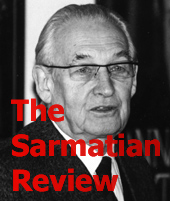| This Issue | Back Issues | Editorial Board | Contact Information |

Six
Years Till Spring:
A Polish Family's Odyssey
Reviewer: Neal Pease
By Teresa Mikosz-Hintzke. New York: iUniverse(www.iuniverse.com), 2001. xxiii + 367 pages. Paper. $20.95 (available on Amazon.com and BarnesandNoble.com).
On August 1, 1939, the author of this memoir celebrated her fifth birthday during an idyllic summer vacation with her parents on her grandfather's country estate at Chobielin in Great Poland, a stone's throw from the frontier with Germany. A month later the Second World War erupted, plunging the young Teresa Mikosz and her family into the brutal world of disruption, hardship, and death that became the everyday lot of nearly all Poles. Her father, a Polish cavalry officer, fell into enemy hands in the first days of combat and spent the duration of the war languishing in a series of German prison camps. The rest of the extended family fled eastward from Chobielin to the environs of Lwów [Lviv], only to be engulfed in the tide of the Soviet invasion and subsequently deported, along with over a million of their countrymen, into the more remote expanses of Russia.
After this frenetic and calamitous opening, the rest of the book centers on the arduous efforts of the family Mikosz to endure the ordeal, to establish and maintain contact, and eventually to reunite. Released from Soviet bondage in 1941, mother and daughter joined in the mass evacuation of Poles via Central Asia, leaving behind them the graves of five kinfolk who did not survive the rigors of the Soviet exile. They waited out the rest of the war as part of the Polish colony in Iran, where Teresa grew up, made friends, went to school: in short, went through many of the usual experiences of girlhood in an outlandishly unusual setting. Even the restoration of peace did not remove all obstacles to the climactic reunion of loved ones, delayed by distance, confusion, and bureaucracy. The tortuous paths of Captain Mikosz and his wife and child finally met in Ghazi, Lebanon, of all places, in January 1946, the "spring" of the book's title that followed a six-year winter of separation and sorrow.
Now a longtime resident of the Chicago area, Teresa Mikosz-Hintzke has pieced together this story from a patchwork of family reminiscences, private and official correspondence, and her own prodigious memory. She has a novelist's eye for the colorful or telling detail, especially in her descriptions of the bleak horrors of Soviet captivity, and her sunnier recounting of Near Eastern exotica. Mikosz-Hintzke has wisely chosen to build her narrative around the framework of her parents' wartime letters to one another, reproduced in full and incorporated within the text. These are ordinary and remarkable at the same time: bursting with scarcely controlled emotion and anxiety, yet restrained and comforting, devoted to quotidian commonplaces that would inform and reassure while not offending the censor, hopeful against hope that things would turn out all right in the end. In their own unassuming way, these exchanges compose a powerful testimony to the dignity and resilience of the human spirit.
Do we learn anything new from this grim tale with a bittersweet, uplifting happy ending? Not really; it adds another title to a modestly growing list of accounts of the wartime sufferings of Poles under Soviet rule, a topic still largely unrecognized by the general public; but one suspects that most readers who pick up this volume in the first place will already know at least the gist of this story, and will encounter nothing that is historically surprising. Still, this book is about the Polish nation in its time of greatest trial only on one level. At heart, it is a story about the ability of love and faith to prevail against all odds, and that is a lesson always worth relearning.
Back to the April 2003 Issue
The Sarmatian Review
sarmatia@rice.edu
Last updated 4/16/03